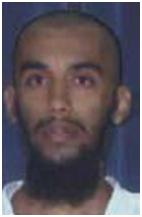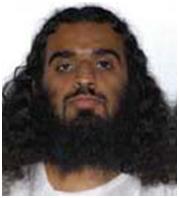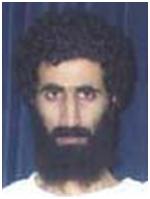|
|
|
Fahd Saleh Suleiman al Jutayli was reportedly killed in a shootout in northern Yemen. Photo courtesy of the NEFA Foundation. |
A former Guantanamo detainee has reportedly been killed in a shootout between the Yemeni Army and Houthi rebels in northern Yemen. The former detainee, Fahd Saleh Suleiman al Jutayli, was captured in Pakistan after fleeing the Tora Bora Mountains in 2001. He was repatriated to his native Saudi Arabia in May 2006.
According to the Yemen Post, two other former Gitmo detainees – Yusuf al Shehri and Othman al Ghamdi – called their families to tell them Jutayli had been killed in the fighting and asked them to inform Jutayli’s family.
Earlier this year, the Saudi government included all three of these former Guantanamo detainees – Jutayli, Shehri, and Ghamdi – on a list of the Kingdom’s 85 most wanted terrorists. After being released from Guantanamo, the three graduated from Saudi Arabia’s rehabilitation program and joined eight other former Gitmo detainees in fleeing south to Yemen. All eleven joined al Qaeda in the Arabian Peninsula.
|
|
|
Yusuf al-Shehri, a former Gitmo detainee, reportedly informed his family of Jutayli’s death. Photo courtesy of the NEFA Foundation. |
The escape of the eleven former Gitmo detainees from Saudi Arabia was reportedly organized by still other Gitmo veterans. Writing in the May 2009 issue of the CTC Sentinel, Dr. Christopher Boucek, an associate in the Middle East Program at the Carnegie Endowment for International Peace, said that Saudi officials found their disappearance “was well-coordinated in advance.” Their escape “was allegedly coordinated with other non-Saudi former Guantanamo detainees who have been repatriated to other countries, indicating that returnees have maintained ties from Guantanamo,” Boucek reported.
That the eleven, one of whom has since been returned to Saudi custody, were brought back into al Qaeda’s fold is not surprising. All of them, including the recently deceased Jutayli, have longstanding ties to al Qaeda. (For a detailed analysis of each of the eleven former detainees, see Evan Kohlmann’s report for the NEFA Foundation.)
According to documents produced at Guantanamo, US intelligence officials found that Jutayli was recruited by the notorious Saudi Sheikh Ha Al Uqla to wage jihad in “Kashmir, Pakistan or Chechnya.” Jutayli “joined the Taliban after receiving a Fatwa from Sheik Ha Al Uqla at the Immam Muhammad Bin Saud College in Burayda, Saudi Arabia.”
|
|
|
Othman al-Ghamdi, former Gitmo detainee, reportedly informed his family of Jutayli’s death. Photo courtesy of the NEFA Foundation. |
Sheikh Uqla, “who issued fatwahs and encouraged people to fight jihad against Christians and Jews” and condoned the September 11 attacks, allegedly facilitated Jutayli’s trip to Afghanistan in 2001. Jutayli stayed at the Nebras Arab guesthouse, outside of the al Farouq training camp. Jutayli was then trained at al Farouq on various weapons during September 2001. According to the US government, an al Qaeda explosives expert oversaw Jutayli’s training.
After the US-led invasion of Afghanistan, Jutayli fled to the Tora Bora Mountains. US intelligence officials found that Jutayli “was identified by a senior al Qaeda operative as a fighter belonging to the Khallad Bin Attash group at Tora Bora in late 2001.” Jutayli was “described as a new mujahidin.”
Jutayli was asked about his al Qaeda ties during his combatant status review tribunal (CSRT) at Gitmo. Jutayli denied that he had been recruited to go to Afghanistan or that Sheikh Uqla facilitated his travels. Jutayli said he hadn’t heard of al Qaeda until he was detained at Guantanamo, and that he had ended up at Tora Bora in late 2001 by chance. He claimed that while he had gone to Afghanistan to learn how to fight, he was only trained on a handgun and did not know the name of the training facility (al Farouq) where he was instructed.
But in the context of these denials, Jutayli made a number of important admissions. For example, he did not pretend he went to Afghanistan for charitable purposes. In a Q&A session with US military officials, Jutayli conceded that he went to Afghanistan for training.
Q. What training did you desire? A. Just light training. I didn’t know what kind of training it was.
Q. Why did you need to go all the way to Afghanistan to get light training? Could you not have received it in your home country? A. I didn’t know there was [sic] problems in Afghanistan.
Although he denied knowing the name of the al Farouq camp (one of al Qaeda’s chief pre-9/11 training facilities) when he trained there, he did not dispute during his CSRT that al Farouq is where he trained. Jutayli only denied that he had been at al Farouq for two months:
Q. You got to Afghanistan and went to al Farouq for a while and you also spent time in Tora Bora trying to get out? What else did you do? A. I didn’t stay in al Farouq for 2 months.
Q. Your total time in Afghanistan was 2 months, then? A. Approximately, yes.
Jutayli’s description of how he made his way to al Farouq matches what is known about al Qaeda’s procedures for filtering new recruits into its training facilities. Jutayli said that he carried money and his passport to Afghanistan. But as his tribunal members surely noticed, his story sounded eerily similar to al Qaeda’s standard operating protocols.
Q. What happened to the money you took with you to Afghanistan? A. It was with my passport.
Q. So, you lost the money and your passport also? A. Yes.
Q. Who did you give your money and passport to? A. A person I do not remember.
Q. Where did you give it to them and why? A. So that he could take care of it for me and it would not get lost.
Q. Did you choose to do this or did this person persuade you to do this? A. He suggested it to me.
Jutayli then explained that “they” took his passport at “a small house,” which “they” put him in as soon as he arrived.
The scenario described by Jutayli during his CSRT has been reenacted time and again. Al Qaeda typically takes new recruits’ passports and other identifying information and gives them a new jihadist identity. This marks a break with their pre-al Qaeda past and also makes it difficult for them to be identified should they be detained.
Because al Qaeda’s leaders take their recruits’ passports and other paperwork, the safety deposit boxes and safe houses where they are stored have become valuable intelligence collection points for authorities. In fact, al Qaeda’s substantial bureaucracy leaves an evidentiary trail that makes it possible for investigators to piece together at least some of the details of a Gitmo detainee’s past.
This was the case with Jutayli. US intelligence authorities found Jutayli’s name “on a computer used by suspected al Qaeda members,” which listed “associates incarcerated in Pakistan.” Another list including Jutayli’s name was “recovered from safehouse raids associated with suspected al Qaeda [members] in Karachi, Pakistan.”
And perhaps most importantly, Jutayli’s name “was found on a hard drive associated with a senior al Qaeda operative seized during raids on 1 March 2003 in Pakistan.” Although the government’s documents do not explicitly say so, this “senior al Qaeda operative” may very well be Khalid Sheikh Mohammed, who was captured on that same day in Rawalpindi.
Despite the abundant evidence against Jutayli, including his own admissions, the Saudi was repatriated to his home country. Interestingly, this move was made despite the fact that a “Foreign Government Service listed [Jutayli] as a high priority Saudi.”
Conversely, Jutayli promised “he would not participate in another Jihad if he was released.” Obviously, he lied. Although the precise circumstances of his death have not been reported, Jutayli took off for Yemen after being freed by the Saudis. There, he took part in one of al Qaeda’s most violent and dangerous jihads – the war for Yemen.











4 Comments
So wait…who killed them? The rebels or the government?
How many of the total Gitmo detainees have returned to the battlefield?
How many were innocent travelers wandering around Pakistan and Afghanistan and now they are radicalized because they were illegally detained and tortured?
How many real innocent people have died at the hands of these murderers who lie and cheat and steal, and are supported by the apologists worldwide?
Rehabilitated? Right. Brainwashed or real beliefs that will never change? Maybe we need the death penalty for these criminals.
Was this story picked up by the AP or on the front page of the NY Times?
The Thunder Run has linked to this post in the blog post From the Front: 10/01/2009 News and Personal dispatches from the front and the home front.
aren”t the houthi shiite?